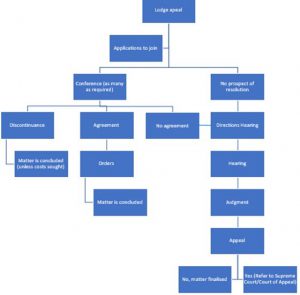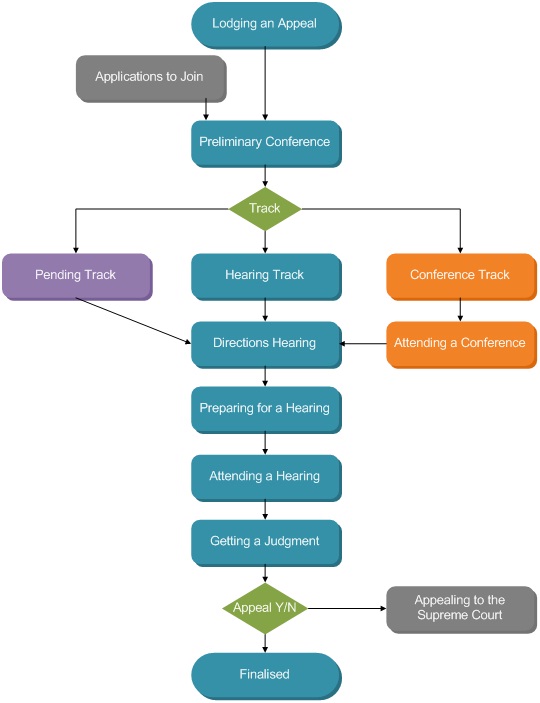Before you use this guide, you need to be aware of three important limitations.
- This guide is just that – a guide. It is not comprehensive or definitive. The Court has Rules and Practice Directions that set out in detail how the Court operates. Because each case is different, Court procedures may vary from case to case. It is the Judges, Commissioners and Masters who decide how each case is to be dealt with and it is their direction that must be followed.
- This is a guide for the ERD Court process only. If you are going to represent yourself, you will need to understand not only the Court process, but you will also need to understand and be ready to argue the substance and merits of your case. This guide does not deal with substance and merit arguments.
- The ERD Registry is only able to provide procedural advice and cannot answer questions of a legal nature.
On the lodgement of a Notice of Appeal the process will follow the following process:

View information videos on YouTube to learn more about the ERD Court appeal process.
An appeal lodged in the ERD Court will be listed for a preliminary conference normally about four weeks after lodgement unless a request is made on your appeal form. At the preliminary conference the matter will be placed into one of three tracks: pending, conference, or hearing track.
In the Courts experience, parties often want to amend proposal plans after they lodge an appeal with the Court. Amended plans are still required to be assessed by the relevant authority under delegated responsibility or by the Development Assessment Panel. The pending track allows negotiations to occur between the parties providing time for amendments to be made and amended plans to be considered by a Development Assessment Panel. Matters assigned to the pending track will be listed for another preliminary conference at a time suitable to the Court and parties taking into consideration when the assessment will be completed.
See Preliminary Conference for further information.
If your matter is assigned to the conference track it will be listed for an hour long conciliation conference. The conference track allows parties to have time to talk freely about the issues in confidence and in an informal way with the aim of finding a resolution yourselves, whilst being assisted by a member of the Court. The conference will be convened by the Court and usually will be chaired by a Commissioner. If the parties resolve the matter during this stage, the parties are required to consent to a draft order, normally prepared by the Council. After the Court receives the consent of each party an Order of the Court concludes the matter.
See Conciliation Conference for further information.
The development appeal process is explained in more detail in the following flowchart:

- ERD Court Rules, Practice Directions and Forms
- ERD Court civil divisional fees
- ERD Court criminal divisional fees
- ERD Court Native Title divisional fees
